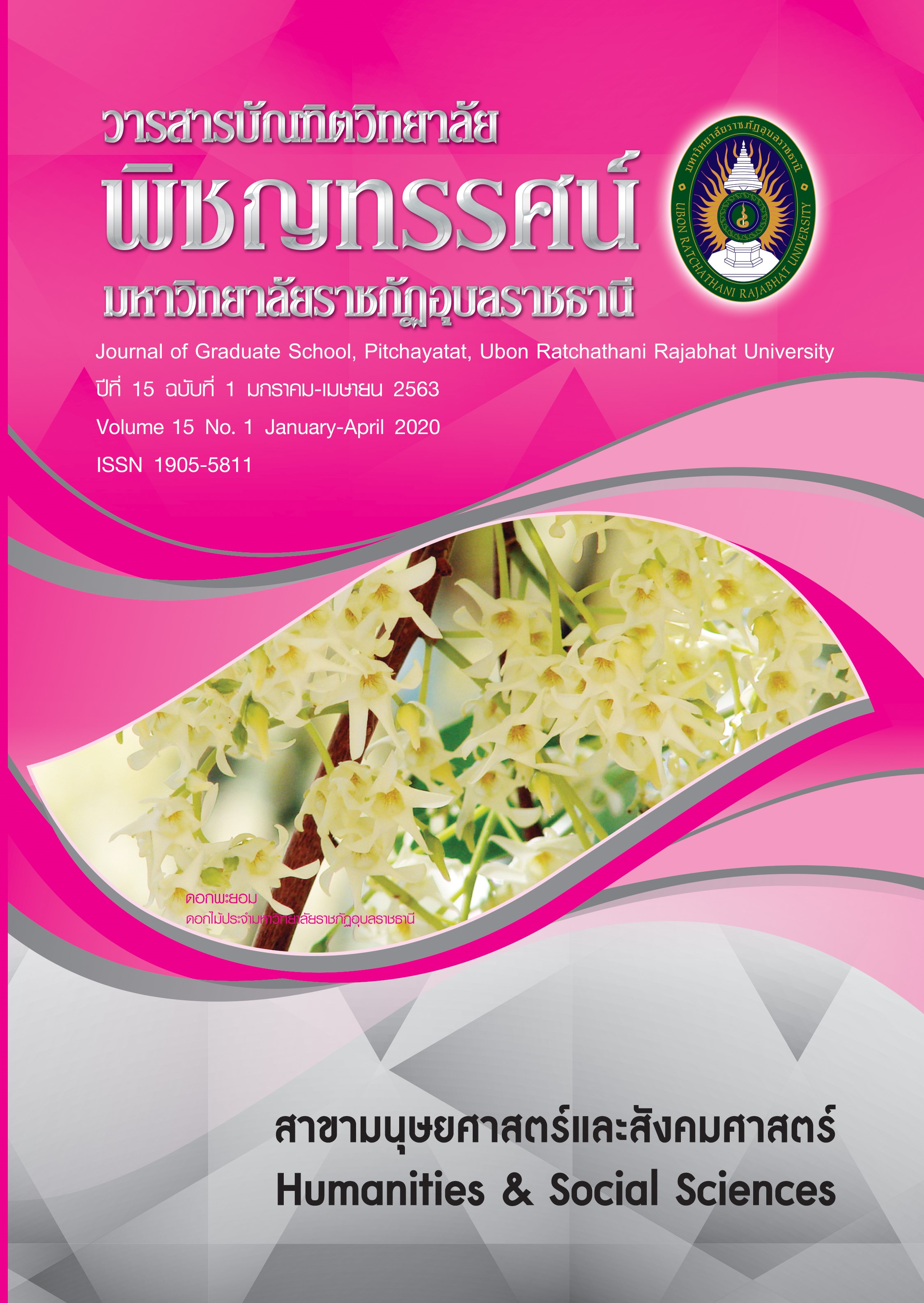การพัฒนาหลักสูตรฝึกอบรมเพื่อพัฒนาทักษะด้านเทคโนโลยีสารสนเทศและการสื่อสาร ของครูโรงเรียนมัธยมศึกษา สังกัดสำนักงานเขตพื้นที่การศึกษามัธยมศึกษา เขต 11
คำสำคัญ:
การพัฒนาหลักสูตรฝึกอบรม, ทักษะด้านเทคโนโลยีสารสนเทศและการสื่อสาร, สำนักงานเขตพื้นทีการศึกษามัธยมศึกษา เขต 11บทคัดย่อ
การวิจัยครั้งนี้มีวัตถุประสงค์เพื่อพัฒนาและประเมินประสิทธิผลของหลักสูตรฝึกอบรมเพื่อพัฒนาทักษะด้านเทคโนโลยีสารสนเทศและการสื่อสารของครูโรงเรียนมัธยมศึกษา สังกัดสำนักงานเขตพื้นที่การศึกษามัธยมศึกษา เขต 11 มีวิธีการดำเนินการวิจัย 4 ขั้นตอน คือ 1) ศึกษาสังเคราะห์องค์ประกอบการพัฒนาหลักสูตรตัวอย่างได้แก่ผู้เชี่ยวชาญ 5 คน ครูผู้สอน 45 คน 2) การสร้างหลักสูตรฝึกอบรมตัวอย่างคือผู้ทรงคุณวุฒิ 6 คน 3) ทดลองใช้หลักสูตรฝึกอบรมตัวอย่างคือครู 40 คน และ 4) การประเมินหลักสูตรโดยผู้ทรงคุณวุฒิ 9 คน เครื่องมือที่ใช้ได้แก่ แบบสัมภาษณ์ แบบสอบถาม และแบบประเมิน สถิติที่ใช้ได้แก่ ร้อยละ ค่าเฉลี่ย ส่วนเบี่ยงเบนมาตรฐาน และทดสอบทีแบบกลุ่มสัมพันธ์
ผลการวิจัยพบว่า
- หลักสูตรฝึกอบรมที่พัฒนาขึ้นมี 6 องค์ประกอบ คือ 1) หลักการและเหตุผล 2) วัตถุประสงค์
3) เนื้อหา 4) กิจกรรม 5) สื่อที่ใช้ และ 6) การวัดและประเมินผล ส่วนโครงสร้างเนื้อหามี 5 หน่วย คือ 1) ความเข้าใจ เกี่ยวกับการจัดการเรียนรู้ในศตวรรษที่ 21 ด้านไอซีที 2) การสร้างสรรค์ความรู้ผ่านชิ้นงาน 3) การแก้ปัญหาและ
ผังงาน 4) การเขียนโปรแกรมภาษาไพธอนเบื้องต้น และ 5) อินเทอร์เน็ตประสานสรรพสิ่ง - ผลการทดลองใช้หลักสูตร พบว่าครูผู้เข้าอบรมมีความรู้และทักษะหลังการทดลองใช้หลักสูตรสูงกว่าก่อนการทดลองอย่างมีนัยสำคัญทางสถิติที่ระดับ .01
- ผลการประเมินหลักสูตรฝึกอบรม พบว่าอยู่ในเกณฑ์ระดับเหมาะสมมาก
เอกสารอ้างอิง
เกียรติศักดิ์ สังข์ด้วง. “การพัฒนาหลักสูตรฝึกอบรมเสริมสร้างศักยภาพครูในการส่งเสริมอาชีพของนักเรียนและชุมชนโดยใช้โรงเรียนเป็นฐานเพื่อพัฒนาท้องถิ่น,” วารสารวิชาการมหาวิทยาลัยราชภัฏภูเก็ต. 13, 1 (มกราคม–มิถุนายน 2560): 321-342.
จันทิมา แสงเลิศอุทัย. การพัฒนาหลักสูตรเสริมสร้างสมรรถภาพทางด้านเทคโนโลยีสารสนเทศและการสื่อสาร (ICT) สำหรับนักศึกษาวิชาชีพครู. วิทยานิพนธ์การศึกษาดุษฎีบัณฑิต มหาวิทยาลัยศรีนครินทรวิโรฒ, 2550.
ถนอมพร เลาหจรัสแสง. การเรียนรู้ในยุคสมัยหน้า : ตอนอนาคตครูไทยครูพันธุ์ C. (ออนไลน์) 2553 (อ้างเมื่อ 25 ตุลาคม 2560). จาก http://sornorinno.blogspot.com/2010/
ธนียา เทียนคำศรี. “การพัฒนาฝึกอบรมครูเพื่อการออกแบบกิจกรรมพัฒนาทักษะชีวิตในการแก้ปัญหาอย่าง สร้างสรรค์ของนักเรียนระดับประถมศึกษา,” รมยสาร. 12, 1 (มกราคม-มิถุนายน 2557): 103-115.
รสสุคนธ์ มกรมณี. “ครูไทยนับ ICT” เอกสารประกอบการประชุมทางวิชาการของครุสภาประจำปี 2556 เรื่องการวิจัยเพื่อเพิ่มคุณภาพการศึกษาและการพัฒนาวิชาชีพ. กรุงเทพฯ: สำนักงานเลขาธิการครุสภา, 2556.
ราชบัณฑิตยสถาน. พจนานุกรมศัพท์ศึกษาศาสตร์ ฉบับราชบัณฑิตยสถาน. กรุงเทพฯ: อรุณการพิมพ์, 2555.
สัมมา รธนิธย์. หลัก ทฤษฎีและปฏิบัติการบริหารการศึกษา. พิมพ์ครั้งที่ 3. กรุงเทพฯ: ข้าวฟ่าง, 2556.
ศึกษาธิการ, กระทรวง. หลักสูตรแกนกลางการศึกษาขั้นพื้นฐาน พุทธศักราช 2551, กรุงเทพฯ: โรงพิมพ์ชุมนุม สหกรณ์การเกษตรแห่งประเทศไทย, 2552.
ศึกษาธิการ, กระทรวง. ตัวชี้วัดและสาระการเรียนรู้แกนกลาง กลุ่มสาระการเรียนรู้วิทยาศาสตร์ (ฉบับปรับปรุง พ.ศ. ๒๕๖๐). ตามหลักสูตรแกนกลางการศึกษาขั้นพื้นฐาน พุทธศักราช 2551. กรุงเทพฯ: โรงพิมพ์ชุมนุมสหกรณ์การเกษตรแห่งประเทศไทย, 2560.
สุไม บิลไบ. สมรรถนะ ทักษะ และบทบาทของครูไทยในศตวรรษที่ 21. (ออนไลน์) 2558 (อ้างเมื่อ 23 เมษายน 2558). จาก https://drsumaibinbai.wordpress.com/
อรุณ จุติผล. การพัฒนาการพัฒนาหลักสูตรฝึกอบรมครูเพื่อพัฒนาความสามารถในการคิดวิเคราะห์ของนักเรียนโรงเรียนอาชีวศึกษาเอกชน. วิทยานิพนธ์ครุศาสตรดุษฎีบัณฑิต มหาวิทยาลัยวงชวลิตกุล, 2554.
Ackerman, E. [n.d.]. Piaget’s Constructivism, Papert’s Constructionism: What’s the difference?. (online) 2001 (cited 8 July 2018). Available https://learning.media. mit.edu/content/publications/EA
Guskey. Evaluation Professional Development. (online) 2010 (cited 26 November 2018). Available http://urbanschools.osu.edu/principal/resourse.html.
ดาวน์โหลด
เผยแพร่แล้ว
รูปแบบการอ้างอิง
ฉบับ
ประเภทบทความ
สัญญาอนุญาต
บทความทุกเรื่องได้รับการตรวจความถูกต้องทางวิชาการโดยผู้ทรงคุณวุฒิภายนอกอย่างน้อย 3 คน ความคิดเห็นในวารสารพิชญทรรศน์เป็นความคิดเห็นของผู้นิพนธ์มิใช่ความคิดเห็นของผู้จัดทำ จึงมิใช่ความรับผิดชอบของวารสารพิชญทรรศน์ และบทความในวารสารพิชญทรรศน์สงวนสิทธิ์ตามกฎหมายไทย การจะนำไปเผยแพร่ต้องได้รับอนุญาตเป็นลายลักษณ์อักษรจากกองบรรณาธิการ





